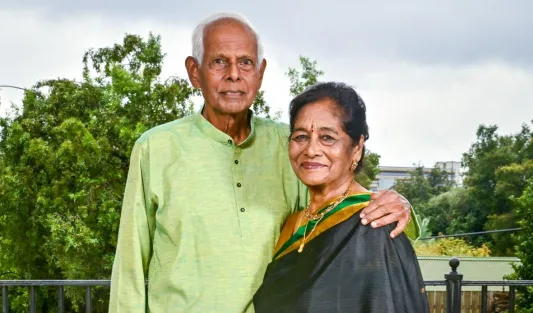Dr Dori Moodley: the seeker who walks with books
A community servant

Dr Dori Moodley with this wife, Peri Moodley.
Image: Supplied
IN THIS time when many have grown impatient with nuance, and the fast, techno-savvy become the wise, Dr Dori Moodley continues to walk slowly, purposefully, and with a book near him at all times.
Sometimes a scripture. Sometimes a philosophy text. Sometimes the POST. Always something that stirs the soul and provokes the mind. It is this lifelong companionship with the written word, and a devotion to the spoken one, that brings us to the moment of his third book: Learning from the Law of Karma: A Hindu Viewpoint.
This book, which will be launched on Saturday, is not just a book launch. It is the mark of a community servant who lives in pursuit of meaning. It is a moment that brings Durban, and indeed the wider South African Indian community, into quiet celebration of a scholar, a community leader, a teacher, and an unapologetic devotee of seva.
Born in the working-class suburb of Mayville, Moodley came from humble beginnings with his father a waiter and his mother famously known for her delicious murku. But something about that home, perhaps it was the discipline, perhaps it was the dreams, that laid the foundation for a mind that would seek rigour, clarity, and a deep sense of spiritual responsibility.
After completing his schooling at Sastri College, Moodley moved on to take up further studies and employment at the University College for Indians on Salisbury Island campus, the early incarnation of what would later become the University of Durban-Westville (UDW) and later still the University of KwaZulu-Natal (UKZN).
As a young student, his first instinct was to walk the path of the pure sciences, the world of equations, chemistry and physical laws. But the universe, with its quiet sense of direction, had other plans. It drew him steadily and irreversibly into the folds of the Orient, into Sanskrit texts, Tamil chants, and the metaphysical flows of Hindu thought. From there, he entered into a lifelong dialogue with the philosophical traditions of his ancestors, dreaming of the paths they walked and seeking answers to his numerous questions.
What began as curiosity became vocation; and what began as reading became worship. He stayed at UDW for nearly 45 years. But during this time, he moved beyond the confines of the university to offer his service to the community. He chaired the Durban Region Eisteddfod when it was at its height, bursting with iyal, isai and nadagam in all its glory. He lent his time and energy to the Dravida Society of South Africa, where he is now a life-long member and trustee.
When retirement arrived, instead of slowing down, Moodley accelerated, taking on roles with the South African Hindu Maha Sabha, various interfaith bodies, and the Cultural, Religious and Linguistic Rights Commission.
To spend time with Dr Moodley is to encounter someone who wears philosophy lightly but lives it deeply. He does not overwhelm with doctrine. He invites. He reflects. He translates the abstract into lived experience. It is no surprise, then, that his books have titles that begin with “Learning.”
Learning from Conflict, Learning from Euthanasia, and now Learning from the Law of Karma, all from a Hindu viewpoint. These are not mere theoretical explorations. They are the fruit of contemplation, community work, and a kind of moral restlessness that refuses to separate belief from responsibility.
To write a book, especially one that navigates complex Hindu philosophical terrain with clarity and courage, is no small feat. To write three in the later chapters of one's life, when most choose silence or ease, is nothing short of remarkable. However, this is only achievable through the unwavering support of his dedicated wife of 61 years, Peri Moodley, who understands the value, purpose and commitment of seva.
Professor Brij Maharaj, who has known Moodley across five decades, offered this reflection. He says: “Dori is not only a scholar of Hindu scriptures and rituals, but a living embodiment of dharma (righteous conduct) and seva (selfless service). My association with Dr Dori Moodley spans half a century, initially when I was an undergraduate student, and thereafter when we were both colleagues in the geography department at UDW, and above all, when I recruited him to serve on the executive of the South African Hindu Maha Sabha, where he was subsequently elected as Deputy President and Trustee.”
In Maharaj’s telling, Dr Moodley’s legacy cannot be reduced to footnotes and committee minutes. It lives in every eisteddfod he helped organise, in every lecture he has delivered, in every interfaith dialogue where he reminded all present that Hinduism, at its core, is expansive, inclusive, and humane.
“In his unwavering commitment to community empowerment, Dori has always upheld the importance of unity, respect, moral responsibility, interfaith harmony, and social cohesion in South Africa. Dr Moodley’s work with the SA Hindu Maha Sabha has strengthened interfaith dialogue, cultural pride, and national unity, making him an invaluable pillar in South Africa's religious and cultural landscape.
"Not surprisingly, he was selected through a competitive, national, public nomination process to serve on the Cultural, Religious and Linguistic (CRL) Rights Commission. Indeed, it is this belief in living culture that underpins Dr Moodley’s public work. As a commissioner on the CRL Rights Commission, he advanced not only Hindu rights, but the broader principles of religious freedom, cultural dignity and linguistic diversity. His work created bridges, between generations, between traditions, and between faiths.”
And still, at his core, he remains a husband, father, and grandfather. A man who can recite a scripture, then change a lightbulb, and, in his mother’s footsteps, punch out perfectly round murkus. Yes, Dori Moodley is launching a book. But the community is launching its gratitude. He would probably deflect the attention, smile gently, and reach for yet another book to read. But we know better.
For those who have the courage to live their philosophy, we must recognise and appreciate their noble efforts in the pursuit of wisdom.
In the Bhagavad Gita, Lord Krishna teaches Arjuna:
“Yogah karmasu kaushalam”
“Yoga is skill in action.” (Bhagavad Gita 2.50).
It is a reminder that the pursuit of wisdom is not only in silent contemplation, but in action infused with awareness, purpose, and grace.
Moodley’s efforts, marked by careful thought and courageous action, has been nothing less than this yoga: the elegant harmony of knowledge, compassion, and cultural commitment.

Professor Nalini Moodley
Image: Supplied
Professor Nalini Moodley is the daughter of Dr Dori Moodley.
The launch of Dr Dori Moodley’s third book, Learning from the Law of Karma: A Hindu Viewpoint, will take place today (Saturday) at the Dravida Society Hall (opposite AD Lazarus High School), in Reservoir Hills, at 2pm. RSVP: N Moodley on 083 751 2114.